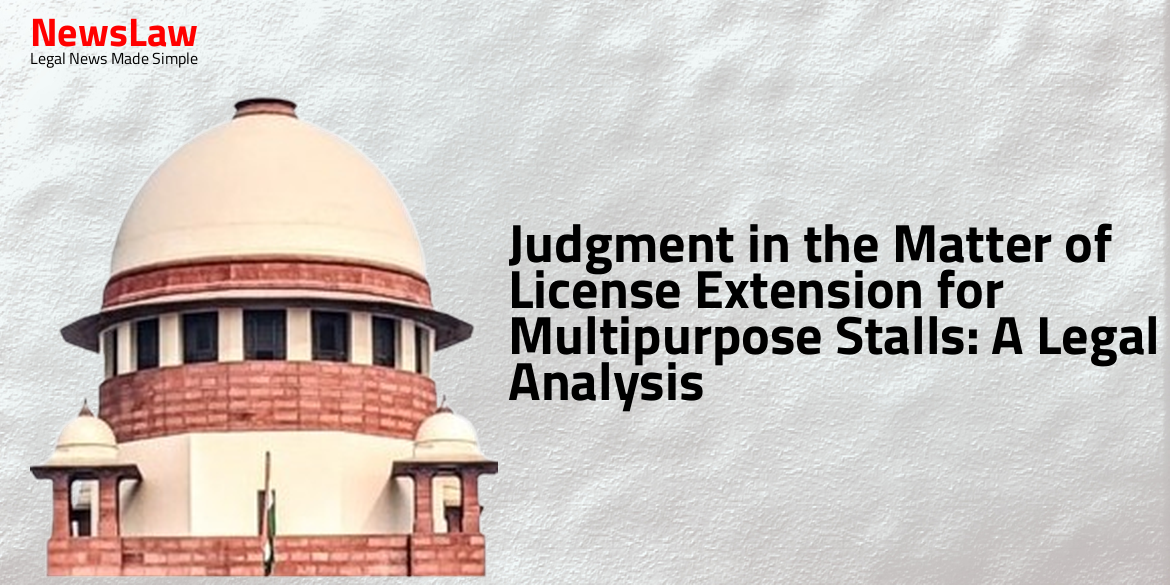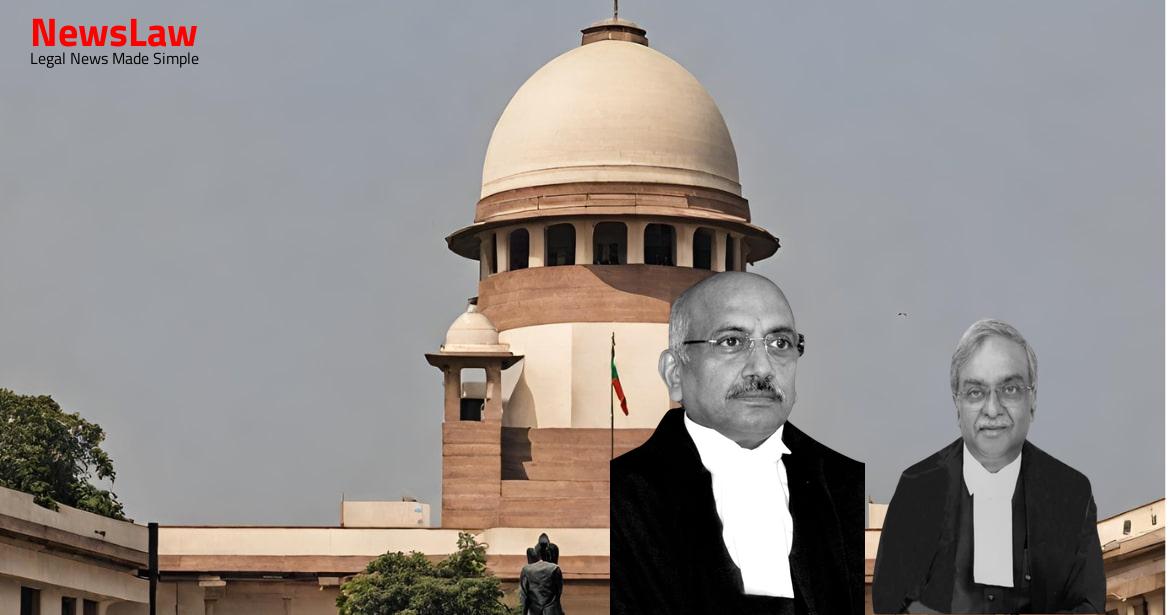Exploring the intricacies of license extensions for Multipurpose Stalls, the Delhi High Court recently rendered a significant judgment. This legal analysis delves into the case involving the extension of licenses for stall owners, providing insights into the rights of the parties involved. The court’s decision carries implications for the future of license agreements and policy compliance among business operators in similar situations.
Facts
- The tenure of licenses for the petitioners was initially until 21.12.2022, but due to Covid-19 lockdown, it was extended until 27.02.2023.
- The Master License Agreements and extension letters from 14.12.2022 have been challenged in the petition.
- Clause 3 of the agreements clearly states no extension or renewal of the agreement.
- Petitioner no.2 and respondent executed a Master License Agreement on 29.10.2021.
- Petitioner no.3 and respondent executed a Master License Agreement on 17.08.2020.
- The petitioners were directed to vacate their MPS on 27.02.2023.
- Petitioner no.1 runs three MPS at Bareilly Railway Station, petitioner no.2 runs one MPS at Moradabad Railway Station, and petitioner no.3 runs one MPS at Haridwar Railway Station.
- The petitioners were compelled to convert their stalls/trolleys to MPS in 2017 as per Commercial Circular No 61 of 2017.
- The petitioners and respondent confirmed the license arrangement with the following agreements: Master License Agreement dated 31.03.2021 for petitioner no.1; Master License Agreement dated 29.10.2021 for petitioner no.2; Master License Agreement dated 17.08.2020 for petitioner no.3.
Arguments
- The petitioners argue that the extension of the contract due to Covid-19 is arbitrary compared to other units in different railway zones which were granted longer dies non periods.
- They claim that the reduction in foot traffic at railway stations led the authorities to lower license fees from June 2020 to March 2022, and thus the petitioners should also be entitled to a proportional extension of their license period.
- Citing various legal cases, the petitioners challenge Clause 5 of the 2017 Policy, stating that it violates Article 14, Article 19(1)(g), and Article 21 of the Constitution by eliminating the right of renewal and forcing existing licensees to compete with larger companies.
- They seek a mandamus to compel the relevant zonal railways to renew and extend their licenses, arguing that they have a legitimate expectation of license renewal based on previous judgments.
- The petitioners contend that the new policy, which prohibits license renewal or extension, is discriminatory and arbitrary, especially since they have already benefited from the policy by having a five-year tenure.
- Emphasizing on the concept of licenses governed by the 2017 Policy, the petitioners claim that they should be allowed to sustain their business operations and renew their licenses indefinitely.
- They challenge the conversion of their stalls to MPS units under coercion and economic duress, arguing that they were not given the option to participate in tender processes or renewal applications.
- The petitioners also argue that the location where the court should be approached is based on the doctrine of forum conveniens, citing relevant legal precedents in support of their stance.
- The petitioner signed a contract under a non-renewable 5-year period as indicated in the letter of award.
- The petitioner cannot now request to go back to a policy that is no longer in existence.
- The judgment of the Supreme Court cited by the petitioner is inapplicable to the Multipurpose Stall Policy in this case.
- The petitioner cannot seek advantage by trying to revert to previous policies after enjoying the benefits of the contract till its completion.
- The contract of the petitioner is not under the Catering Policy but under a different policy.
Analysis
- The 2017 Policy includes a 33% sub quota for women in the allotment of MPS units across all categories of stations.
- Clause 9 of the 2017 Policy ensures reservation in allotment for marginalized sections of society.
- The petitioners voluntarily converted their stalls/trolleys to MPS as per the Railway Board’s scheme.
- There is no provision for renewal under the Easements Act or the 2017 Policy for MPS units.
- Force Majeure clause applied to catering and vending contracts during the lockdown period.
- Petitioners did not challenge a letter dated 21.05.2020 issued by the Railway Board.
- The 2017 Policy safeguards the rights of marginalized minorities and weaker sections of society.
- Reservation percentages are specified in the 2017 Policy for different categories of stations.
- Challenges to Clause 5 and 11 of the 2017 Policy are deemed invalid.
- License extensions were granted due to Covid-19 as per the Force Majeure clause.
- The policy decision to retender all MPS units after tenure expiry does not impede livelihood rights.
- Petitioners were extended licenses for a specific period due to Force Majeure events.
- Zonal railways determined extension periods based on ground realities at specific stations.
- The specific part of the judgment discusses the arguments and counter-arguments presented by the parties
- It analyzes the relevant legal provisions and case laws to determine the applicability of the law to the present case
- The court considers the facts and evidence presented before reaching a conclusion
- The judgment provides a detailed explanation of the reasoning behind the decision
- It establishes the legal principles that guided the court in arriving at its verdict
- The courts have the jurisdiction to declare the law as unconstitutional.
- The Karnataka High Court in judgment dated 19.02.2024 in W.P. (C) 24598/2023 titled Gulfeeza Begum v. Union of India rejected a challenge to the 2017 Policy, emphasizing the breach of fundamental rights as necessary for a writ of Mandamus.
- Judicial review of policy decisions and mandamus to frame policy are distinct.
- The court may interpret laws with a creative process involved.
- Legitimate expectation does not always guarantee relief and can be negated by public interest, policy changes, or valid reasons provided by the decision-maker.
- Public bodies cannot arbitrarily decline license renewals as per Ramana Dayaram Shetty v. International Airport Authority of India.
- Decisions not to renew licenses can be rational unless proven otherwise by compelling reasons.
- A writ of Mandamus cannot be issued to direct the enactment of laws or framing of rules.
- Mandamus is for enforcing fundamental or statutory rights or duties related to them.
- Individual license agreements and the 2017 Policy contain an arbitration clause.
- The arbitration clause can be invoked if the petitioners are aggrieved due to insufficient extension because of the Covid-19 situation.
- The arbitration clause can also be used if the petitioners wish to claim damages.
- Petitioners are at liberty to initiate appropriate proceedings through the arbitration clause.
Decision
- The existing stalls/trolleys have the option to convert into Multipurpose Stalls (MPS) as per the 2017 Policy.
- Petitioners opted to convert their stalls/trolleys to MPS for a tenure of 5 years.
- Space for new MPS will be allotted by Zonal Railways after the current agreement period expires.
- Existing licensees can convert to MPS by paying the quoted License Fee for similarly placed MPS units.
- The tenure of 5 years for converted stalls/trolleys will begin from the date of conversion.
- A period of 3 months is granted to petitioners to vacate the stalls after the extended license period or the date of the judgment, whichever is later.
Case Title: MATHRA DEVI Vs. UNION OF INDIA AND ORS. (2024:DHC:4452)
Case Number: W.P.(C)-6214/2024



